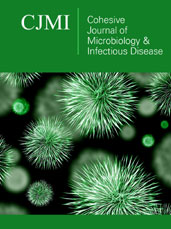- Submissions

Full Text
Cohesive Journal of Microbiology & Infectious Disease
Microbial Etiology of Cancer
Mosab Nouraldein MH*
Department of Medical Parasitology, Sudan
*Corresponding author:Mosab Nouraldein MH, Department of Medical Parasitology, Sudan
Submission: December 30, 2018; Published: March 22, 2019

ISSN 2578-0190 Volume2 Issue4
Abstract
Cancer is a very serious health problem affects huge number of people around the globe, up to date there is no known treatment to cancer due to diversity of disease and unknown etiology of cancer. I think that cancer occurrence must be attributed to microbes which person gains after birth. To confirm that theory we should conduct many laboratory and clinical investigations involving large sample size with different age group and various risk factors and then examine the relation between microbe and cancer.
Keywords: Cancer; Bacteria; Commensal; Pathogen; Etiology
Introduction
Cancer is the sickness reasoned by an unrestrained division of atypical cells in a part of the body; these can consequence in tumours; damage to immune system; and other harm that can be lethal. Some forms of cancer result in noticeable growths named tumor; while others such as leukaemia; do not. The majorities of the body’s cells have specific roles and fixed life spans. Cell death is part of innate and advantageous phenomenon named apoptosis. A cell gets orders to die so that the body can substitute it with a newer cell that functions better. Cancerous cells are deficient in the constituents that order them to discontinue dividing and to die. Accordingly; they increase in the body using oxygen and nutrients that would regularly feed other cells. Cancerous cells can form tumours; damage the immune system and reason other alterations that stop the body from working on a regular basis.
Cancerous cells may emerge in one part; and then extend through the lymph nodes. Many microbial infections may lead to malignancies if left untreated such as Schistosoma haematobium which may lead to bladder carcinoma; Helicobacter pylori which may cause stomach cancer; Salmonella typhi may lead to gall bladder cancer; Chlamydophila pneumoniae which may lead to lung cancer; Escherichia coli and colon cancer; Streptococcus bovis and colorectal cancer and many viral infections may lead to cancer. I think that cancers occur due to microbial cause either due to infection with pathogenic microbe or due to eradication in number or by changing their normal habitat of normal microbial flora which play an important immunological and physiological role in the human body. Extensive studies about the relationship between microorganism and cancer must be conducted; certainly, the relation about the commensal bacteria and cancer.
Dietary physical, chemical and even psychological reasons may lead affect the normal microbial flora and may lead to cancer after long or short period of time according to the nature and dose of the carcinogen. Most persons born free from bacteria and free from cancer, so I think that there is an intimate relation between cancer and microorganism; chiefly commensal bacteria. I suggest that any chronic defect in the role of normal flora lead to cancer; to confirm that we must perform concentrated studies involving many persons at different age groups and exposed to various risk factors.
© 2019 Mosab Nouraldein MH,. This is an open access article distributed under the terms of the Creative Commons Attribution License , which permits unrestricted use, distribution, and build upon your work non-commercially.
 a Creative Commons Attribution 4.0 International License. Based on a work at www.crimsonpublishers.com.
Best viewed in
a Creative Commons Attribution 4.0 International License. Based on a work at www.crimsonpublishers.com.
Best viewed in 







.jpg)






























 Editorial Board Registrations
Editorial Board Registrations Submit your Article
Submit your Article Refer a Friend
Refer a Friend Advertise With Us
Advertise With Us
.jpg)






.jpg)














.bmp)
.jpg)
.png)
.jpg)










.jpg)






.png)

.png)



.png)






